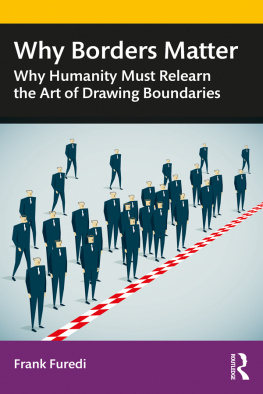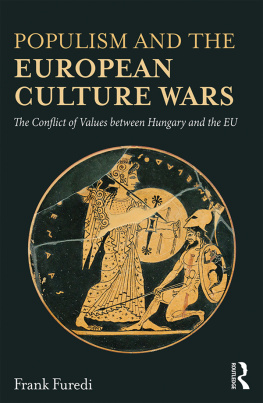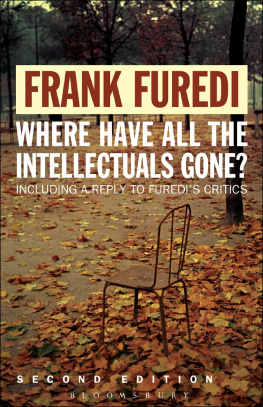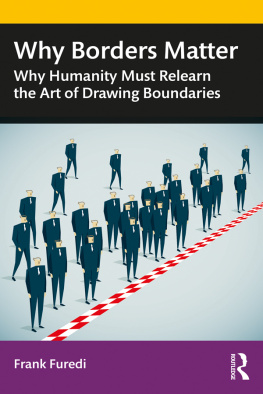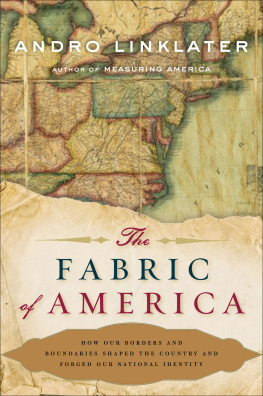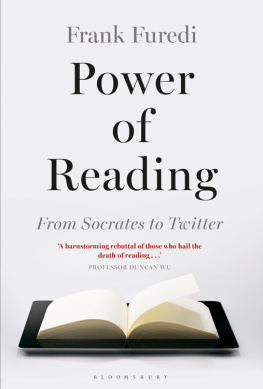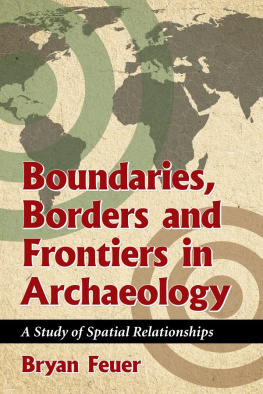Frank Furedi - Why Borders Matter: Why Humanity Must Relearn the Art of Drawing Boundaries
Here you can read online Frank Furedi - Why Borders Matter: Why Humanity Must Relearn the Art of Drawing Boundaries full text of the book (entire story) in english for free. Download pdf and epub, get meaning, cover and reviews about this ebook. year: 2021, publisher: Routledge, genre: Politics. Description of the work, (preface) as well as reviews are available. Best literature library LitArk.com created for fans of good reading and offers a wide selection of genres:
Romance novel
Science fiction
Adventure
Detective
Science
History
Home and family
Prose
Art
Politics
Computer
Non-fiction
Religion
Business
Children
Humor
Choose a favorite category and find really read worthwhile books. Enjoy immersion in the world of imagination, feel the emotions of the characters or learn something new for yourself, make an fascinating discovery.
- Book:Why Borders Matter: Why Humanity Must Relearn the Art of Drawing Boundaries
- Author:
- Publisher:Routledge
- Genre:
- Year:2021
- Rating:3 / 5
- Favourites:Add to favourites
- Your mark:
- 60
- 1
- 2
- 3
- 4
- 5
Why Borders Matter: Why Humanity Must Relearn the Art of Drawing Boundaries: summary, description and annotation
We offer to read an annotation, description, summary or preface (depends on what the author of the book "Why Borders Matter: Why Humanity Must Relearn the Art of Drawing Boundaries" wrote himself). If you haven't found the necessary information about the book — write in the comments, we will try to find it.
Why Borders Matter: Why Humanity Must Relearn the Art of Drawing Boundaries — read online for free the complete book (whole text) full work
Below is the text of the book, divided by pages. System saving the place of the last page read, allows you to conveniently read the book "Why Borders Matter: Why Humanity Must Relearn the Art of Drawing Boundaries" online for free, without having to search again every time where you left off. Put a bookmark, and you can go to the page where you finished reading at any time.
Font size:
Interval:
Bookmark:
- Agamben, G. (1995) We refugees, Symposium: A Quarterly Journal in Modern Literatures, vol. 49, no. 2.
- Agamben, G. (1998) Homo Sacer: Sovereign Power and Bare Life, Stanford University Press: Stanford.
- Agier, M. (2017) Borderlands, towards an Anthropology of the Cosmopolitan Condition, Polity Press: Cambridge.
- Akbari, S.C., Herzog, T., Jtte, D., Nightingale, C., Rankin, W. and Weitzberg, K. (2017) AHR conversation: Walls, borders, and boundaries in world history, The American Historical Review, vol. 122, no. 5.
- Altheide, D. (2002) Creating Fear: News and the Construction of Crisis, Aldine Transaction: New Brunswick, NJ.
- Anderson, R.T. (2018) When Harry Became Sally: Responding to the Transgender Moment, Encounter Books: New York.
- Anderson-Gold, S. (2010) Privacy, respect and the virtues of reticence in Kant, Kantian Review, vol. 15, no. 2.
- Appleton, J. (2008) In Defence of Binaries, Notes On Freedom, 25 April.
- Arboleda, V.A., Sandberg, D.E. and Vilain, E. (2014) DSDs: Genetics, underlying pathologies and psychosexual differentiation, Nature Reviews Endocrinology, vol. 10, no. 10.
- Arendt, H. (1956) Authority in the twentieth century, The Review of Politics, vol. 18, no. 4.
- Arendt, H. (1959) Reflections on little rock, Dissent, vol. 6, no. 1.
- Arendt, H. (1970) Men un Dark Times, Jonathan Cape: London.
- Arendt, H. (1998) The Human Condition, 2nd ed., The University of Chicago Press: Chicago.
- Arendt, H. (2006) The crisis in culture, in Arendt, H. (ed.), Between Past and Future, Penguin: London.
- Arendt, H. (2006a) What is authority?, in Arendt, H. (ed.), Between Past and Future, 91141. Penguin: London.
- Arnason, A. (2000) Biography, bereavement story, Mortality, vol. 5, no. 2.
- Arnett, J.J. (2000) Emerging adulthood: A theory of development from the late teens through the twenties, American Psychologist, vol. 55, no. 5.
- Bacevich, A.J. (2009) American Empire, Harvard University Press: Cambridge, MA.
- Baer, M. (2017) When binary thinking is involved, polarization follows, Psychology Today, vol. 27, January.
- Balibar, E. (2004) Alexander von Humboldt Lecture in Human Geography, Radboud University: Nijmegen.
- Balos, B. (2004) A mans home is his castle: How the law shelters domestic violence and sexual harassment, Saint Louis University Public Law Review, vol. 23.
- Barth, F. (1969) Introduction, in Barth, F. (ed.), Ethnic Groups and Boundaries: The Social Organization of Culture Difference, Allen & Unwin: London.
- Baudrillard, J. (1993) The Transparency of Evil: Essays on Extreme Phenomena, Verso: London.
- Baugh, B. (2016) The open society and the democracy to come: Bergson, Deleuze and Guattari, Deleuze Studies, vol. 10, no. 3.
- Bauman, Z. (1996) From pilgrim to tourist: Or a short history of identity, in Hall, S. and Du Gay, P. (eds.), Questions of Cultural Identity, Sage: London.
- Bauman, Z. (2013) Liquid Modernity, John Wiley & Sons: London.
- Beck, U. (2002) The cosmopolitan society and its enemies, Theory, Culture & Society, vol. 19. nos. 12.
- Beck, U. (2003) Understanding the real Europe, Dissent, vol. 50, no. 3.
- Beck, U. (2005) Power in the Global Age: A New Global Political Economy, Polity Press: Cambridge.
- Beck, U. (2006) The Cosmopolitan Vision, Polity Press: Cambridge.
- Benedict, R. (1989) Patterns of Culture, Houghton Mifflin Harcourt: Boston.
- Benhabib, S. (2016) The new sovereigntism and transnational law: Legal utopianism, democratic scepticism and statist realism, Global Constitutionalism, vol. 5, no. 1.
- Berger, P., Berger, B. and Kellner, H. (1974) The Homeless Mind, Penguin: Harmondsworth.
- Bergson, H. (1956) The Two Sources of Morality and Religion, Doubleday: Garden City, New York.
- Bertram, C. (2018) Do States Have the Right to Exclude Immigrants, Polity Press: Cambridge.
- Birchall, C. (2019) Draft manuscript, Opaque openness: The problem with/of transparency.
- Blom-Cooper, L. (1967) Forward to Wesin, A.F. (ed.), Privacy and Freedom, The Bodley Head: London.
- Bloom, A. (1987) The Closing of the American Mind: How Higher Education Has Failed Democracy and Impoverished the Souls of Todays Students, Penguin Books: London.
- Bodhi, B. (1991) A Note Openness, Buddhist Publication Society, no. 17, https://www.bps.lk/olib/nl/nl017.pdf.
- Bonikowski, B., Halikiopoulou, D., Kaufmann, E. and Rooduijn, M. (2019) Populism and nationalism in a comparative perspective: A scholarly exchange, Nations and Nationalism, vol. 25, no. 1.
- Bosniak, L. (1999) Citizenship denationalized, Indiana Journal of Global Legal Studies, vol. 7, no. 2.
- Bourdieu, P. (1984) Distinctions: A Social Critique of the Judgement of Taste, Routledge: London. Bourdieu, P. (1995) The Logic of Practice, Polity Press: Cambridge.
- Boyd, J.W. and Donald, A. (1979) Is zoroastrianism dualistic or monotheistic?, Journal of the American Academy of Religion, vol. 47, no. 4.
- Bristow, J. (2019) Stop Mugging Grandma: The Generation Wars and Why Boomer Blaming Wont Solve Anything, Yale University Press: New Haven.
- Brown, W. (2017) Walled States, Waning Sovereignty, Zone Books: New York.
- Brubaker, R. (1992) Citizenship and Nationhood in France and Germany, Harvard: Cambridge, MA.
- Brubaker, R. (2018) Gender and Race in an Age of Unsettled Identities, Princeton University Press, Princeton, NJ.
- Burrill, D.R. (1966) The changing status of moral authority, Harvard Theological Review, vol. 59, no. 3.
- Calcutt, A. (1998) Arrested Development: Pop Culture and the Erosion of Adulthood, Cassell: London.
- Canovan, M. (1996) Nationhood and Political Theory, Edward Elgar: Cheltenham.
- Canovan, M. (1999) Is there an Arendtian case for the nation-state?, Contemporary Politics, vol. 5, no. 2.
- Carens, J. (1987) Aliens and citizens: The case for open borders, The Review of Politics, vol. 49, no. 2.
- Chemaly, S. (2018) Rage Becomes Her: The Power of Womens Anger, Simon and Schuster: New York.
- Clarke, J.A. (2019) They, them, and theirs, Harvard Law Review, no. 894.
- Cohen, J. (2013) The Private Life, Granta: London.
- Cooper, B. (2018) Eloquent Rage: A Black Feminist Discovers Her Superpower, St. Martins Press: New York.
- Debray, R. (2010) loge Des Frontires, Gallimard: Paris.
- Delanty, G. (2006) Borders in a changing Europe: Dynamics of openness and closure, Comparative European Politics, vol. 4, nos. 23.
- Delsol, C. (2003a) Icarus Fallen: The Search for Meaning in an Uncertain World, ISI Books: Wilmington, DE.
- Delsol, C. (2003b) The Search for Meaning in an Uncertain World, ISI Books: Wilmington, DE.
- Delsol, C. (2015) Unjust Justice: Against the Tyranny of International Law, ISI Books: Wilmington, DE.
- Derrida, J. (1981) Positions, The Athlone Press: London.
- Derrida, J. and Ferraris, M. (2000) A Taste for the Secret, trans. Giacomo Donis, Polity Press: Cambridge.
- Diener, A.C. and Hagen, J. (2012) Borders: A Very Short Introduction, Oxford University Press: Oxford.
- Dineen, T. (1999) Manufacturing Victims: What the Psychology Industry Is Doing to People, Robert Davies Publishers: Toronto.
- Douglas, M. (1999) Implicit Meanings Selected Essays in Anthropology, Routledge: London.
Font size:
Interval:
Bookmark:
Similar books «Why Borders Matter: Why Humanity Must Relearn the Art of Drawing Boundaries»
Look at similar books to Why Borders Matter: Why Humanity Must Relearn the Art of Drawing Boundaries. We have selected literature similar in name and meaning in the hope of providing readers with more options to find new, interesting, not yet read works.
Discussion, reviews of the book Why Borders Matter: Why Humanity Must Relearn the Art of Drawing Boundaries and just readers' own opinions. Leave your comments, write what you think about the work, its meaning or the main characters. Specify what exactly you liked and what you didn't like, and why you think so.

